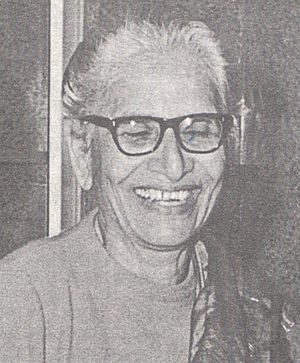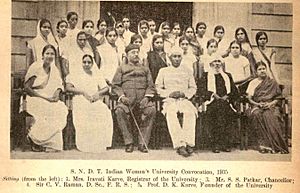Irawati Karve facts for kids
Quick facts for kids
Irawati Karve
|
|
|---|---|
 |
|
| Born | 15 December 1905 |
| Died | 11 August 1970 |
| Alma mater | Fergusson College, Poona Bombay University |
| Occupation | Anthropologist |
| Spouse(s) | Dinkar Dhondo Karve |
Irawati Karve (born December 15, 1905 – died August 11, 1970) was an important Indian sociologist and anthropologist. She was also a teacher and writer from Maharashtra, India. Many people consider her to be the first female Indian sociologist.
Contents
Early Life and Learning
Irawati Karve was born on December 15, 1905. Her family was wealthy. She was named after the Irrawaddy River in Burma. Her father worked there for a cotton company.
From age seven, she attended a girls' boarding school in Pune. Later, she studied philosophy at Fergusson College. She graduated in 1926. She then studied sociology at Bombay University. In 1928, she earned her master's degree. Her thesis was about her own caste group.
Marriage and Further Studies
While studying, Irawati married Dinkar Dhondo Karve. He was a chemistry teacher. His father, Dhondo Keshav Karve, was famous for helping women get an education.
In November 1928, Irawati went to Germany for more studies. She got a loan from Jivraj Mehta to pay for it. She studied at the Kaiser Wilhelm Institute. Two years later, she earned her doctorate degree. She then returned to India.
Irawati and Dinkar lived a life that was different from what was common then. Dinkar was an atheist. Irawati visited a Hindu temple, but she said it was more for "tradition" than belief.
Her Career as a Scholar
From 1931 to 1936, Karve worked at SNDT Women's University in Bombay. She also taught advanced classes there. In 1939, she moved to Deccan College in Pune. She became a Reader in sociology. She stayed there for the rest of her career.
Irawati Karve is known as the first Indian female anthropologist. In India, anthropology and sociology were often seen as the same field. She was interested in many subjects. These included anthropology, measuring human bodies, blood studies, and ancient studies. She also collected folk songs and translated poems.
She started the anthropology department at what is now the University of Pune.
Leading Departments and Writing
For many years, Karve led the Sociology and Anthropology Department at Deccan College. She also led the Anthropology Division at the National Science Congress in New Delhi in 1947. She wrote books and articles in both Marathi and English.
Her Important Works
Irawati Karve wrote many important books. Here are some of them:
- Kinship Organization in India (1953): This book looked at different social groups in India.
- Hindu Society — an interpretation (1961): In this book, she studied Hindu society. She used information she gathered from her trips. She also studied old texts in Hindi, Marathi, Sanskrit, and Pali. She wrote about the history of the caste system in Hinduism.
- Maharashtra — Land and People (1968): This book describes different social customs and traditions in Maharashtra.
- Yuganta: The End of an Epoch: This book studies the main characters of the Mahabharata. She treated them as real people from history. She used their actions to understand the time they lived in. Karve first wrote this book in Marathi. Later, she translated it into English. The book won an award in 1967.
- She also wrote several books in Marathi, including Paripurti, Bhovara, Amachi Samskruti, Samskruti, and Gangajal.


